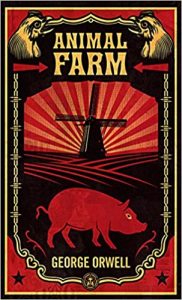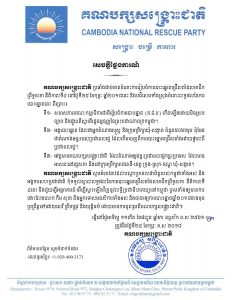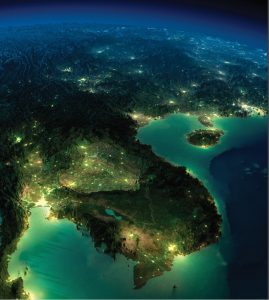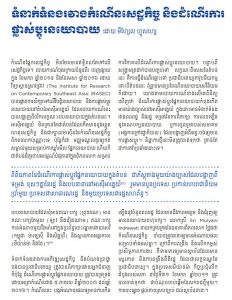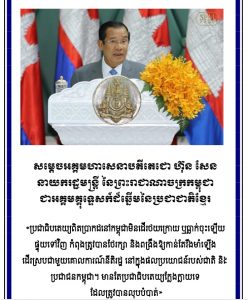អត្ថបទដោយ បណ្ឌិតហ្គាហ្វា ពាងម៉េត
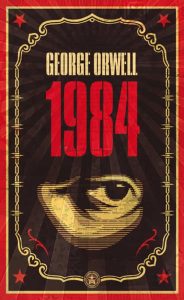 រឿងប្រលោមលោក « Nineteen Eighty-Four » ឬ «ដប់ប្រាំបួន-ប៉ែតសិបបួន» ស្តីអំពីជីវិតស្ថិតក្រោមអំណាចផ្តាច់ការត្រូវបានសកលវិទ្យាល័យសហរដ្ឋអាមេរិកនានាតម្រូវអោយនិស្សិតឆ្នាំទី១អានសម្រាប់កម្មវិធីសិក្សា។ ទាំងនៅក្នុងនិងទាំងនៅក្រៅថ្នាក់រៀន យើងសង្កេតឃើញការប្រើគុណនាមសព្ទ Orwellian នៅពេលនិយាយអំពីឥរិយាបថនិងគោលនយោបាយដែលគ្រប់គ្រងដោយការប្រើភាសាថ្មី ការឃោសនា ការលួចឃ្លាំមើល ការផ្សាយពត៍មានបោកបញ្ឆោត ការបដិសេធការពិត ការកែប្រែប្រវត្តិសាស្រ្ត ការគ្រប់គ្រងគំនិតនិងការបញ្ចុះបញ្ចូលគំនិតថ្មី និងការអនុវត្តន៌អំណាចផ្តាច់ការ។ ពាក្យគន្លឹះ និងគំនិតជាច្រើនចេញពីប្រលោមលោក 1484 ត្រូវបានគេយកមកប្រើនៅសព្វថ្ងៃនេះ ដូចជាពាក្យថា «បងធំ» (Big Brother) «គំនិតទ្វេរដង» (double think — ស្អប់ខ្ពើមរបបនៅក្នុងក្នុងគំនិត តែគោរពកោតខ្លាចជាសាធារណៈ) «បទឧក្រិដ្ឋគំនិត» (thought crime) «ប៉ូលីសគំនិត» (thought police) ។ល។ និង ។ល។
រឿងប្រលោមលោក « Nineteen Eighty-Four » ឬ «ដប់ប្រាំបួន-ប៉ែតសិបបួន» ស្តីអំពីជីវិតស្ថិតក្រោមអំណាចផ្តាច់ការត្រូវបានសកលវិទ្យាល័យសហរដ្ឋអាមេរិកនានាតម្រូវអោយនិស្សិតឆ្នាំទី១អានសម្រាប់កម្មវិធីសិក្សា។ ទាំងនៅក្នុងនិងទាំងនៅក្រៅថ្នាក់រៀន យើងសង្កេតឃើញការប្រើគុណនាមសព្ទ Orwellian នៅពេលនិយាយអំពីឥរិយាបថនិងគោលនយោបាយដែលគ្រប់គ្រងដោយការប្រើភាសាថ្មី ការឃោសនា ការលួចឃ្លាំមើល ការផ្សាយពត៍មានបោកបញ្ឆោត ការបដិសេធការពិត ការកែប្រែប្រវត្តិសាស្រ្ត ការគ្រប់គ្រងគំនិតនិងការបញ្ចុះបញ្ចូលគំនិតថ្មី និងការអនុវត្តន៌អំណាចផ្តាច់ការ។ ពាក្យគន្លឹះ និងគំនិតជាច្រើនចេញពីប្រលោមលោក 1484 ត្រូវបានគេយកមកប្រើនៅសព្វថ្ងៃនេះ ដូចជាពាក្យថា «បងធំ» (Big Brother) «គំនិតទ្វេរដង» (double think — ស្អប់ខ្ពើមរបបនៅក្នុងក្នុងគំនិត តែគោរពកោតខ្លាចជាសាធារណៈ) «បទឧក្រិដ្ឋគំនិត» (thought crime) «ប៉ូលីសគំនិត» (thought police) ។ល។ និង ។ល។
សូមអានអត្ថបទជាភីឌីអេសទាំងស្រុងដូចតទៅ…
George Orwell បាននិព្វន្ធសៀវភៅល្បីជាងគេមានដូចជា កសិដ្ឋានសត្វ និង ដប់ប្រាំបួនប៉ែតសិបបួន។
- លោកអ្នកអាចសេចក្តីសង្ខេបនៃសៀវភៅដប់ប្រាំបួនប៉ែតសិបបួនតាមទំព័រនេះបាន
- លោកអ្នកអាចអាន កសិដ្ឋានសត្វ ឬខ្មែរប្រែជាសៀវភៅថា កាលនោះបដិវត្តន៌មួយជាភាសាខ្មែរ និងភាសាអង់គ្លេស

